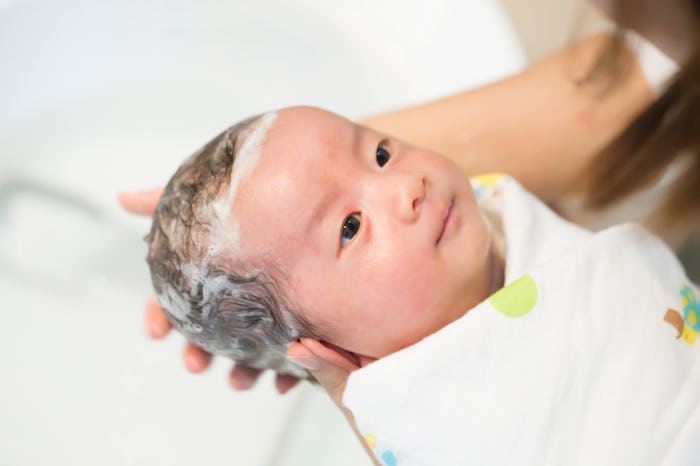Life

Do They *Have* To Bathe Your Baby At The Hospital? Experts Explain
In case you're not aware, newborn babies do not come out shiny and clean. That sturdy, muck-free infant immediately handed to their parents on that one television show? Yeah, that's a lie. In reality, babies are born covered in amniotic fluid, a cheesy-coating called vernix, and usually blood. Honestly, they're kind of gross and slippery, so much so that my husband almost dropped my younger son when he held him for the first time. While your gut reaction might be to clean them up as soon as possible, do they have to bathe your baby at the hospital, or can it wait 24 hours or until you get home? Thankfully, experts have some answers for the soon-to-be parents out there.
Historically, it has often been hospital protocol to bathe the baby in the first few hours after birth, but things are changing as more hospitals are realizing there's value to the things that coat babies' skin. Tracy Berran, a neonatal Nurse Practitioner at NewYork Presbyterian-Weill Cornell Medical Center in New York, tells Romper that while their neonatal nursery has been bathing babies soon after birth for years, they are starting to explore the idea of waiting 24 hours after the baby is born for their first bath. The World Health Organization (WHO) recommends drying a newborn immediately, which prevents hypothermia, as well as not washing a baby in the first six hours of life.
While your baby may look kind of dirty, they're actually covered in some pretty beneficial stuff. The vernix caseosa (which translates to ‘vernix’ = to varnish and ‘caseous’ = cheesy nature, according to the Oxford English Dictionary), covers babies' skin in the last trimester in utero and when they are born. While all babies are born with the vernix, some may be nearly transparent, others could look like a light coating, and some appear like the baby is covered in cottage cheese. A study in the Indian Journal of Dermatology found the vernix to be a multi-purpose must-have: in utero, it keeps the moisture locked in so a baby's skin can grow, it serves as a protective coating during the friction that can be caused during baby's travel through the vaginal canal, and after birth it helps them regulate their body temperature, retain skin moisture, and ward off bacterial and other infections. This is especially helpful in those first few days when they aren't swimming in amniotic fluid anymore. This super fluid helps maintain a proper pH balance of the skin, helps wounds heal faster, and even has antioxidant properties. So why rush to remove it, right?
Typically, after a baby is born either vaginally or via C-section, and if the mom is up to it, the baby is often dried off and placed on mom's chest to start that all-important skin-to-skin contact. Not only does that contact promote bonding, but it helps the baby stay warm. New babies are used to the 98.6 degree womb, so a 70 degree room can be a big shock. If you are nursing, it's recommended that you bring your baby to your breast as soon as possible after birth, according to Donna Murray, RN, BSN, on the VeryWell site.
A few hours after the baby is born, the nurse may come to take the baby back to the nursery for some testing and a bath. Some hospitals allow this to happen in the mom's room, so if this is something you want, make sure you ask. Berran says that before a baby is bathed, they are placed under a warmer. Only when their temperature is steady are they given the bath.
Waiting at least 24 hours before that first bath allows the baby to absorb the vernix and to become a little more accustomed to life outside the womb. Berran says that even if they aren't given a full bath, the nurse can try to wipe their hair to remove some of the blood and amniotic fluid, especially on babies with full heads of hair.
Blood sugar can also be better regulated with a delayed bath, according to Dr. Kathleen Berchelmann, a pediatrician at St. Louis Children's Hospital who writes for the Children's MD Moms Docs site. Because the bath can be stressful for a new baby, it can cause the release of excess stress hormone. "Stress hormones can cause a baby’s blood sugar to drop, which can make a baby too sleepy to wake up and breastfeed," Dr. Berchelmann said, "causing the blood sugar to drop even more."
Some nurseries bathe in the first hours after birth, some wait 24 hours or more, and others do a combination. Just like with breastfeeding, you should find out what the policies are in place in the newborn nursery and express your wishes to your neonatal team. You might even want to wait to have the first bath until you go home and do it yourself. In the end, it's up to you.
Check out Romper's new video series, Bearing The Motherload, where disagreeing parents from different sides of an issue sit down with a mediator and talk about how to support (and not judge) each other’s parenting perspectives. New episodes air Mondays on Facebook.